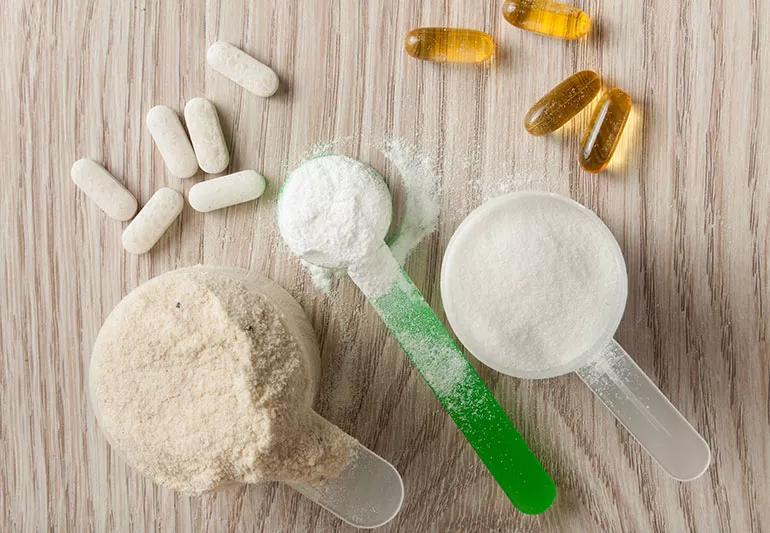These caffeine-packed supplements can give your workouts a boost

If you’re an athlete or a regular gym-goer, you’ve likely heard the buzz around pre-workout supplements. These products promise to boost energy and enhance workout performance.
Advertisement
Cleveland Clinic is a non-profit academic medical center. Advertising on our site helps support our mission. We do not endorse non-Cleveland Clinic products or services. Policy
But before you gulp down a glass of pre-workout powder, it’s important to know what’s actually in this supplement and how it affects your body. Registered dietitian Kate Patton, MEd, RD, CCSD, LD, talks about what it is, what it can do and what to know before you try it.
“Pre-workout supplements are pills or powders that are meant to be consumed about half an hour before exercising,” Patton says.
Each super-charged scoop or capsule acts like a turbo-boost to your system, thanks to a mix of vitamins and nutrients — plus a whole darn lot of caffeine.
Fans of pre-workouts say these concoctions give them extra energy to exercise and help them recover faster afterward.
But how? Patton walks you through the most common ingredients in pre-workout supplements and how they may help improve your performance.
Advertisement
The main ingredient in most pre-workout products is caffeine, which isn’t necessarily a bad thing. “Caffeine can be great in the appropriate amount,” Patton says.“It stimulates the body’s central nervous system, improves reaction time and can reduce fatigue.”
Taking a pre-workout can also:
Just because you can buy them over the counter doesn’t mean they’re 100% safe or without risk. For starters, pre-workouts contain anywhere from 150 milligrams (mg) to 300 mg of caffeine per serving, which can pack the same punch as chugging three cups of coffee in a row. Yikes!
Patton recommends choosing a product with 200 mg caffeine or less per serving. “It’s always wise to read the product label and proceed with caution,” she advises. “And if you’re sensitive to caffeine, pre-workouts are definitely not going to be a good choice for you.”
Even if you’re not typically sensitive to caffeine, the kind of buzz you get from pre-workout can still cause issues associated with over-caffeination, especially if you take more than the recommended amount or if you’ve already had a lot of caffeine beforehand. Side effects include:
And importantly, beware of “dry-scooping,” an incredibly dangerous practice popularized on social media. This perilous TikTok trend involves downing a scoop of dry pre-workout powder without mixing it into water. It can cause choking or aspiration, which can lead to aspiration pneumonia. “And that amount of caffeine all at once can cause irregular heartbeat, palpitations and even a heart attack,” Patton warns.
Pre-workout makes for a quick boost on days when you’re feeling extra sluggish. “These products can be beneficial and safe to take if the ingredients are correctly listed on the label and the company is credible,” Patton says.
If you work out a lot, though, you probably shouldn’t take pre-workout more than once a day, and always be sure to carefully follow dosage instructions.
And remember: You can’t out-supplement a bad diet. The best way to get energy for your workout is by eating healthy foods that are rich in vitamins and nutrients.
“Many of the safe, natural ingredients typically found in pre-workouts can be obtained through eating real food instead,” Patton states. Before you hit the gym, go for:
Advertisement
“You don’t always know what ingredients are packaged into your pre-workout supplements,” Patton says, “but with whole foods, you always know what you’re getting.”
Take a deeper look at some typical pre-workout ingredients, what they do and how to get them naturally in your diet:
Advertisement
Learn more about our editorial process.
Advertisement

This common stimulant can help you feel more awake, alert and focused, but too much of it can cause side effects

This popular stimulant has various impacts on your brain, heart, digestive system and other body systems

There’s no proven way to remove the natural stimulant from your body, but you can counter its effects by staying hydrated and getting in some movement

No amount of caffeine is safe for kids under 12, and kids 12 to 17 should be cautious about how much they consume

Don’t make the mistake of stopping cold turkey

People with PKU need to avoid high-protein foods, like meat, dairy, legumes and whole grains

The caffeine and natural acids in coffee may trigger acid reflux, but there are ways to lessen the effects

Olive oil is high in heart-friendly unsaturated fats

The tropical fruit is a good source of antioxidants and vitamin C

Most people fall asleep within 10 to 20 minutes, but if your experience is different, adjusting your sleep schedule may help

Exploring your hidden side can lead to better understanding of what makes you tick